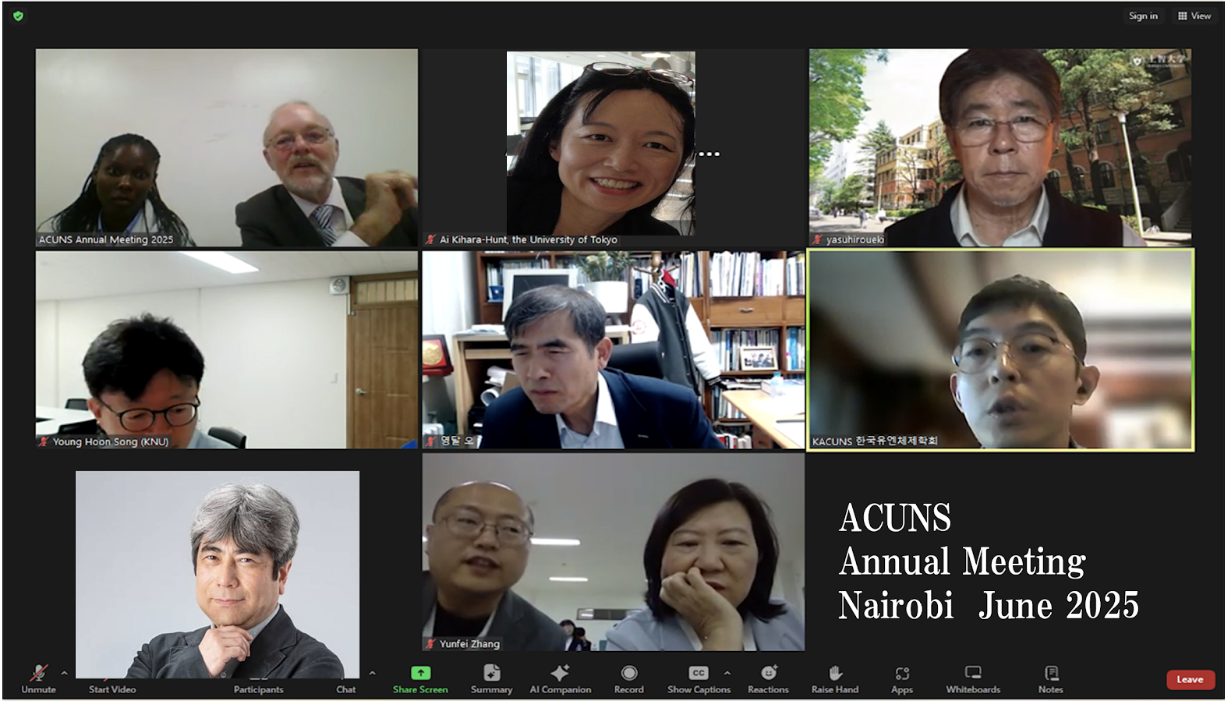The session was convened by Franz BAUMANN (Chair), President of the Academic Council on the United Nations System (ACUNS) and participated by Zhang YUNFEI, UNU-China, Yasushi KATSUMA, Waseda University, Young HOON SONG, Kangwon National University, Tu XINQUAN, The University of International Business and Economics, Yasuhiro UEKI, Sophia University and DongJoon PARK, Jeju Peace Institute (and Director of General Affairs at KACUNS).
Prof. Young Hoon Song (KNU) spoke on the question of why some Rohingya refugees want to go back home and others want to be settled, and what East Asian countries can do to help, based on his field work in refugee camps in Cox Bazar. It can be related to education curriculum that they get while they are in Bangladesh. There is a problem of budget cut for learning centers that provide education to Rohingya refugees. He suggested that East Asian countries can fund educational initiatives. A participant asked if refugees prefer to get education there, or somewhere else. Prof. Song answered that at the refugee camp Rohingya refugees are not allowed to go out, so they get education inside, but others opt to get relocated elsewhere, and suggested that they can be educated in universities in East Asian countries.
Prof. Yunfei Zhang spoke of the need for managing technology development and for the UN to be united to work on climate and biodiversity. She said that China supports of multilateralism for sustainability, global diversity and carbon neutrality. She advocated for working together toward the shared goal.
Prof. Yasuhiro Ueki spoke on the challenges, impact and solutions of multilateralism. The challenges include the withdrawal of the US from multilateralism, power politics including impunity for violation of use of force rules, decline of liberal values and human rights, advance on new science and technology, information manipulation, and proliferation of UN entities. The impact includes defunct UN Security Council, increased military budget rather than international assistance, budget and personnel cut in the UN, turn against climate initiatives, crisis on climate, environment and biodiversity, negative impact on migration and protection of migrants, human rights violations and impunity, weakening international law, manipulation of democratic principles and reality. He provided suggestions to solve the issues. Integrate some mandates, discuss budget biannually, return to biennial budget, integrate Secretariat offices and entities, reform the Security Council, be the leader of ideas, educate young people with UN values, and strengthen strategic communication capabilities.
Prof. Tu Xinquan spoke of multilateralism as a big post-WWII achievement. Some leading countries have given up the rules of multilateralism recently, going back to jungle rules, and that is a challenge. No other country can take place of the US. Other countries should not follow, as only the US can afford to be alone. Multilateralism can work without all the countries involved. Non-discrimination among countries is an important principle for WTO, and it should be kept. It is important that countries stick to each other, even if a certain leading country chooses to be isolated. In particular, middle powers are important and should not lose hope. China is supporting multilateralism since 1971.
Prof. Yasushi Katsuma spoke on the role of universities in helping the UN in the climate and sustainable development agendas. On research, training and education within the UN, he introduced UNITAR, UNU and other subsidiary organizations. Then, the recent UN’s initiatives to approach academic institutions were discussed, including the UN Academic Impact (UNAI; 2010- ) and the Higher Education Sustainability Initiative (HESI; 2012- ). The ACUNS is an independent association of scholars of UN studies, and this model was replicated at the country level in East Asia by the Japan Association of UN Studies (JAUNS), Korean Academic Council on UN System (KACUNS) and the China Academic Net for UN Studies (CANUNS). There are also more spontaneous initiatives launched by universities themselves for sustainability issues, including the sustainable campus networks and the nature of positive universities. The UNU-IAS established the Regional Centers for Expertise on Education for Sustainable Development (RCEs), and the Promotion of Sustainability in Postgraduate Education and Research Network (ProSPER.Net), and the SDG-Universities Platform (SDG-UP) to encourage universities to contribute to sustainable development in partnership with the UN.
Prof. DongJoon Park reflected on the presentations. He first discussed the difficulties that the world and the UN are facing globally. At the regional level, there is a big interest in the UN reform in the North East Asia. He asked the presenters how the three countries can find a balance between inclusiveness and the UN system to make it efficient. Second, he asked the speakers, on regional cooperation, what the best way would be, and not discussing each country’s engagement separately. Lastly, at the national level, continuous awareness raising is important. ACUNS and its members can play an important role as non-governmental actors in addressing difficult problems.
There was a question about the US’ withdrawal from Paris Agreement, what Northeast Asian countries can do. He suggested to have a closer collaboration among Asian countries, possibly ASEAN and North-East Asian countries. Prof. Yasuhiro Ueki answered that the three countries can stick to their commitment and work together on environmental issues and climate change. There should be more dialogue at all levels, including in education. It is important to hear the youth’s voice.
Chairperson, Mr. Franz Baumann concluded the session by thanking the participants.





